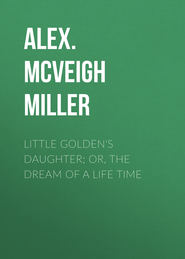По всем вопросам обращайтесь на: info@litportal.ru
(©) 2003-2024.
✖
Pretty Geraldine, the New York Salesgirl; or, Wedded to Her Choice
Настройки чтения
Размер шрифта
Высота строк
Поля
Mr. Clemens did not fly into a rage, as many another would have done in his place. He wished Geraldine joy, told her that the stage had lost an ornament in her withdrawal from it, presented her with the amount of salary still due her, and took a courteous leave.
He knew that he could put on another play, in which the remainder of the company could do very well that night, but he sorely regretted the loss of Geraldine, who had certainly proved a drawing card.
But he could not help the turn of events, so he went his way, bitterly disappointed, while Geraldine called into the other room:
"You can come back now, Cissy, for Mr. Clemens is gone. But, you silly girl, why did you run away? I wished you to know him, he is so nice and handsome!"
There was no answer from her friend, and she went back into the room.
There was Cissy, on a low seat in the darkest corner, and presently there came a low, stifled sob.
Geraldine flung herself on her knees by her friend, in great surprise and alarm.
"Oh, my darling girl! what ails you? Are you sick? Did the bonbons disagree with you?"
"No-o-o!" sighed Cissy.
"Then what is it, dear? Are you in trouble? Or were you angry because the manager came here? But this shall be the last of any stage visitors, I assure you! Or do you want me to go away, Cissy?" plaintively.
"Oh, Gerry, you will drive me mad with your questions! I'll have to tell you my guarded secret!"
CHAPTER XXII.
"THAT WOMAN SHALL PAY DEARLY FOR THIS!"
From my hand I tore in anger
That dear pledge, the wedding ring—
Swore that I would learn to hate him,
But it is so weak a thing,
This poor woman's heart, that, beating
Heavily within my breast,
Aches with jealous grief and anger,
Tortured with a fierce unrest.
Mrs. Alex. McVeigh Miller.
Most bitter were the reflections of the elegant villain, Clifford Standish, during the long night in his prison-cell.
He knew too well that the charge against him was perfectly true, and that his boast to Geraldine that he would clear himself at court was absolutely false.
Two years before, he had secretly married a piquant variety actress, of whom he had soon wearied, but from whose fetters he could not get free.
Her life was absolutely irreproachable, and he could find no flaw in it on which to base an application for divorce.
And all of his flagrant violations of faith, although known too well to his wife, did not goad her to seek release from him.
She loved him, poor creature, with that dog-like devotion seen in some women of average intellect, who love the hand that smites them. She was romantic, and called it constancy; other women called it lack of spirit.
She could not and did not comprehend the baseness of the man she loved.
The end and aim of her poor, wrecked life was to win him back to the allegiance of which he had wearied so soon.
Although she dared not disregard his injunction not to reveal their marriage, she followed him about as often as her engagements would permit, trying to keep track of his movements.
When he was away from the city, she wrote him long love-letters, over which he laughed in heartless amusement.
It was one of these letters that he had pretended to read to Geraldine on the bridge at Alderson, claiming that it contained news of Hawthorne's marriage.
It was this woman who had prevented him from accompanying Geraldine to Newburgh, by threatening to reveal his fatal secret.
At length, driven almost mad by his fiendish conduct, she had thrown caution to the winds, and caused his arrest on the stage that night for desertion.
But she would have trembled with fear could she have heard his threats against her that night as he raged up and down his prison-cell, execrating her as the cause of his losing pretty Geraldine forever.
"A few more hours and my peerless girl would have been mine, all mine! Oh, to miss happiness by so slight a chance, it is horrible, and dearly shall that woman pay for this!" he swore.
But he knew that his wrath was futile, for she would have all the proofs of his conduct ready to cover him with shame in the morning.
The morning found him sullen, bitter, desperate. The policemen said afterward that his eyes looked actually fiendish when he was placed in the Black Maria to be conveyed to the court-house in Chambers street.
That fiendish look was still in his eyes when they started to transfer him from the vehicle to the court-house, and—how it exactly happened they never could tell—but the seemingly quiet prisoner whom they had not thought it necessary to handcuff, suddenly struck out with two athletic fists, landing one startled policeman on the snowy pavement, and the other one flat in the gutter. Then he fled like a professional sprinter, and nobody tried to stop him, perhaps because they pitied the poor devil, and wished him his liberty this glorious Christmas morning.
CHAPTER XXIII.
CISSY'S SECRET
Ay, but, darling, speak his name;
Give to sorrow words and tears;
This strange silence, proud and cold,
Fills my heart with anxious fears.
Curse him, bairnie, or forgive him,
For I know Love's subtle art;
The grief that's never spoken
May sometimes break the heart.
Mrs. Alex. McVeigh Miller.
"I must tell you my guarded secret," sobbed Cissy, to Geraldine, and the latter put a loving arm around her, whispering, tenderly:
"Yes, tell me all, dear; for maybe it will ease your sore heart. You know the poet says:
"'Give sorrow words—the grief that does not speak
Whispers the o'erfraught heart and bids it break.'"
The last rays of the setting sun stole in and rested like a blessing on the dark and golden heads close together, then faded out, and left the little room in gloom as Cissy sighed:
"Oh, I thought I was getting over it; I thought I was contented again until his voice and face brought back the cruel past!"
"Whose voice and face, dear Cissy? Oh, do you mean Mr. Clemens? Did he have anything to do with your secret sorrow?"
"Everything!"
He knew that he could put on another play, in which the remainder of the company could do very well that night, but he sorely regretted the loss of Geraldine, who had certainly proved a drawing card.
But he could not help the turn of events, so he went his way, bitterly disappointed, while Geraldine called into the other room:
"You can come back now, Cissy, for Mr. Clemens is gone. But, you silly girl, why did you run away? I wished you to know him, he is so nice and handsome!"
There was no answer from her friend, and she went back into the room.
There was Cissy, on a low seat in the darkest corner, and presently there came a low, stifled sob.
Geraldine flung herself on her knees by her friend, in great surprise and alarm.
"Oh, my darling girl! what ails you? Are you sick? Did the bonbons disagree with you?"
"No-o-o!" sighed Cissy.
"Then what is it, dear? Are you in trouble? Or were you angry because the manager came here? But this shall be the last of any stage visitors, I assure you! Or do you want me to go away, Cissy?" plaintively.
"Oh, Gerry, you will drive me mad with your questions! I'll have to tell you my guarded secret!"
CHAPTER XXII.
"THAT WOMAN SHALL PAY DEARLY FOR THIS!"
From my hand I tore in anger
That dear pledge, the wedding ring—
Swore that I would learn to hate him,
But it is so weak a thing,
This poor woman's heart, that, beating
Heavily within my breast,
Aches with jealous grief and anger,
Tortured with a fierce unrest.
Mrs. Alex. McVeigh Miller.
Most bitter were the reflections of the elegant villain, Clifford Standish, during the long night in his prison-cell.
He knew too well that the charge against him was perfectly true, and that his boast to Geraldine that he would clear himself at court was absolutely false.
Two years before, he had secretly married a piquant variety actress, of whom he had soon wearied, but from whose fetters he could not get free.
Her life was absolutely irreproachable, and he could find no flaw in it on which to base an application for divorce.
And all of his flagrant violations of faith, although known too well to his wife, did not goad her to seek release from him.
She loved him, poor creature, with that dog-like devotion seen in some women of average intellect, who love the hand that smites them. She was romantic, and called it constancy; other women called it lack of spirit.
She could not and did not comprehend the baseness of the man she loved.
The end and aim of her poor, wrecked life was to win him back to the allegiance of which he had wearied so soon.
Although she dared not disregard his injunction not to reveal their marriage, she followed him about as often as her engagements would permit, trying to keep track of his movements.
When he was away from the city, she wrote him long love-letters, over which he laughed in heartless amusement.
It was one of these letters that he had pretended to read to Geraldine on the bridge at Alderson, claiming that it contained news of Hawthorne's marriage.
It was this woman who had prevented him from accompanying Geraldine to Newburgh, by threatening to reveal his fatal secret.
At length, driven almost mad by his fiendish conduct, she had thrown caution to the winds, and caused his arrest on the stage that night for desertion.
But she would have trembled with fear could she have heard his threats against her that night as he raged up and down his prison-cell, execrating her as the cause of his losing pretty Geraldine forever.
"A few more hours and my peerless girl would have been mine, all mine! Oh, to miss happiness by so slight a chance, it is horrible, and dearly shall that woman pay for this!" he swore.
But he knew that his wrath was futile, for she would have all the proofs of his conduct ready to cover him with shame in the morning.
The morning found him sullen, bitter, desperate. The policemen said afterward that his eyes looked actually fiendish when he was placed in the Black Maria to be conveyed to the court-house in Chambers street.
That fiendish look was still in his eyes when they started to transfer him from the vehicle to the court-house, and—how it exactly happened they never could tell—but the seemingly quiet prisoner whom they had not thought it necessary to handcuff, suddenly struck out with two athletic fists, landing one startled policeman on the snowy pavement, and the other one flat in the gutter. Then he fled like a professional sprinter, and nobody tried to stop him, perhaps because they pitied the poor devil, and wished him his liberty this glorious Christmas morning.
CHAPTER XXIII.
CISSY'S SECRET
Ay, but, darling, speak his name;
Give to sorrow words and tears;
This strange silence, proud and cold,
Fills my heart with anxious fears.
Curse him, bairnie, or forgive him,
For I know Love's subtle art;
The grief that's never spoken
May sometimes break the heart.
Mrs. Alex. McVeigh Miller.
"I must tell you my guarded secret," sobbed Cissy, to Geraldine, and the latter put a loving arm around her, whispering, tenderly:
"Yes, tell me all, dear; for maybe it will ease your sore heart. You know the poet says:
"'Give sorrow words—the grief that does not speak
Whispers the o'erfraught heart and bids it break.'"
The last rays of the setting sun stole in and rested like a blessing on the dark and golden heads close together, then faded out, and left the little room in gloom as Cissy sighed:
"Oh, I thought I was getting over it; I thought I was contented again until his voice and face brought back the cruel past!"
"Whose voice and face, dear Cissy? Oh, do you mean Mr. Clemens? Did he have anything to do with your secret sorrow?"
"Everything!"











